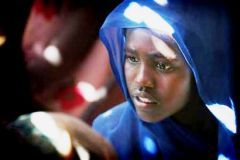Raped Darfur women wrestle with fate of babies
By Nima Elbagir
KALMA, Sudan, Feb 19 (Reuters) – When Hawa reported the rape of her and seven other women in Darfur by Arab militia, the police told her to forget it had happened.

|
|
A young girl listens to women talking in a counselling tent at Abushouk camp near El Fasher, the capital of North Darfur state November 7, 2004. The camp is home to more than 45,000 people who have fled fighting in western Sudan’s troubled Darfur region, where sexual violence against women is common. (Reuters). |
“The police came at night and said; ‘Do you want to make us like Iraq? Do you want to bring foreign troops here?”‘ she said in southern Darfur’s Kalma camp, which is home to some of the two million people displaced by two years of violence in Darfur.
“The rapes never stop, sometimes there are more, sometimes less,” she said, accusing militiamen known as Janjaweed of the crime. “Now the Janjaweed babies are being born and the girls are throwing them down latrines,” she said.
“Better the babies are lost this way than we carry the burden,” she said, falling silent as she stared into her coffee cup.
U.N. Secretary-General Kofi Annan urged the Security Council Wednesday to take immediate steps to stop the Darfur war, which has killed at least 70,000 people since March.
Women in the overcrowded camp say the birth of children conceived by rape brings unwelcome attention from the security forces, who they say are either unwilling or unable to ease their plight.
“Sometimes the security forces come and ask questions when they hear it is a Janjaweed baby. Better we say the babies were never born,” Hawa said.
Hawa’s friends point out a woman who gave birth to a child conceived by rape. The victim nods as the women explain how the child died of malnutrition because the mother was too distressed to breast-feed.
Darfur rebels have accused the Sudanese government of using the Arab militia as a proxy force to crush their uprising. Rebels and human rights groups say they have looted and burned villages in Darfur and conducted a campaign of rape.
The government says it recruited some militias to fight the rebellion but not the Janjaweed, who it has called outlaws.
“WHERE IS AMERICA?”
“The honor of our women has become cheap,” said one man who fled his home 14 months ago. “Where is America, where are those who say they care?”
“We are castrated. We lie here under trees while our women go out to be raped because we cannot leave the camps,” he said.
The man with him gestures angrily at the camera.
“The journalists come and they write their stories and take our pictures and we are the ones who stay behind to suffer. You come here and then leave and the police beat and humiliate us. Go away,” he said.
The authorities said new police had been brought from outside the region to try and build the trust of the displaced.
“The police today are not the same force. They have been trained in how to handle the situation,” said Alhaj Atta Almannanm, governor of South Darfur State.
“It is the displaced who are traumatized and still obsessed with what went before and so see intimidation and violations everywhere,” he said.
After years of tribal conflict over scarce resources, Darfur’s rebels took up arms in February 2003, accusing Khartoum of neglect and giving preferential treatment to Arab tribes.
“Until the day the United Nations gives us a certificate to say trust the government and go home, I will stay in the camps and watch my youth rot,” Hawa said.
